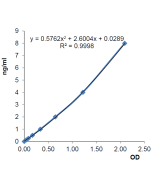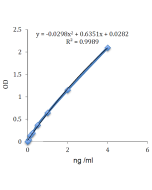Cookie Policy: This site uses cookies to improve your experience. You can find out more about our use of cookies in our Privacy Policy. By continuing to browse this site you agree to our use of cookies.
AdipoGen Life Sciences
Progranulin (human) (rec.)

To examine the signal of phospho-p44/42 MAPK and p44/42 MAP kinase, reactions were carried out at 37°C over 0, 30, 60, mins, respectively by adding the Progranulin (human) (rec.) (Prod. No. AG-40A-0068Y) (100ng/ml) to the THP-1 monocyte cells, which were maintained with serum starvation for 24hrs.
Cell migration of THP-1 monocytic leukemia cells was evaluated in disposable 24 well transwell polystyrene membrane with 8μm size pores. 0ng/ml, 10ng/ml ,100ng/ml and 250ng/ml of Progranulin (human) (rec.) were diluted in RPMI 1640 supplemented with 0.5% FBS respectively. In case boiled hProgranulin, proteins were boiled at 100°C for 10min. And then hProgranulin samples were added to the lower chamber. THP-1 cells (2 X 10^5 cells per well), in the same media with Progranulin (human) (rec.), were added to the upper chamber. After 16 hours incubation at 37°C in 5% CO2 humidified atmosphere, migration cells in the lower chamber were counted. Migrated cells in two separate fields per well from triplicate wells were enumerated on a hemacytometer by means light microscopy.
| Product Details | |
|---|---|
| Synonyms | Proepithelin; PEPI; PC Cell-derived Growth Factor |
| Product Type | Protein |
| Properties | |
| Source/Host | HEK 293 cells |
| Sequence |
Signal peptide and human progranulin (aa 1-593) are fused at the C-terminus to a FLAG®-tag. |
| Crossreactivity | Human |
| Biological Activity |
Activates ERK phosphorylation in THP-1 and MCF10A cells and induces cell migration of THP-1 monocytic leukemia cells. |
| MW | ~90kDa (SDS-PAGE) |
| Purity | ≥98% (SDS-PAGE) |
| Endotoxin Content | <0.01EU/μg purified protein (LAL test; Lonza). |
| Concentration |
After reconstitution: for 10µg size: 0.1mg/ml for 50µg size: 1 mg/ml |
| Reconstitution |
10µg size: Reconstitute with 100µl sterile water. 50µg size: Reconstitute with 50µl sterile water. |
| Formulation | Lyophilized. Contains PBS. |
| Other Product Data |
UniProt link P28799: Granulins (human) [Precursor] FLAG is a registered trademark of Sigma-Aldrich Co. |
| Shipping and Handling | |
| Shipping | BLUE ICE |
| Short Term Storage | +4°C |
| Long Term Storage | -20°C |
| Handling Advice |
After reconstitution, prepare aliquots and store at -20°C. Avoid freeze/thaw cycles. Centrifuge lyophilized vial before opening and reconstitution. PBS containing at least 0.1% BSA should be used for further dilutions. |
| Use/Stability |
Stable for at least 6 months after receipt when stored at -20°C. Working aliquots are stable for up to 3 months when stored at -20°C. |
| Documents | |
| MSDS |
 Download PDF Download PDF |
| Product Specification Sheet | |
| Datasheet |
 Download PDF Download PDF |
Progranulin (PGRN) is a widely expressed pluripotent growth factor which plays a role in processes such as development, wound repair and inflammation by activating signaling cascades that control cell cycle progression and cell motility. Its function in the central nervous system is of interest, as mutations in the PGRN gene were found in cases of frontotemporal degeneration (FTLD). In addition, PGRN has also been linked to tumorigenesis. Progranulin is a biomarker for FTLD, other types of Alzheimer‘s Disease (AD) and potentially for MCI (Mild Cognitive Impairment). Additionally, PGRN is described as a new ligand of TNF receptors and a potential therapeutic against inflammatory disease like arthritis. EphA2, a member of the large family of Ephrin receptor tyrosine kinases, is also a functional signaling receptor for progranulin as reported recently.
- Premature termination codon readthrough upregulates progranulin expression and improves lysosomal function in preclinical models of GRN deficiency: J. Frew, et al.; Mol. Neurodeg. 15, 21 (2020)
- Reduction of Progranulin-induced Breast Cancer Stem Cell Propagation by Sortilin-targeting Cyclotriazadisulfonamide (CADA) Compounds: K. Berger, et al.; J. Med. Chem. 64, 12865 (2021)
- Microglia regulate brain Progranulin levels through the endocytosis-lysosomal pathway: T. Dong, et al.; JCI Insight e136147 (2021)









